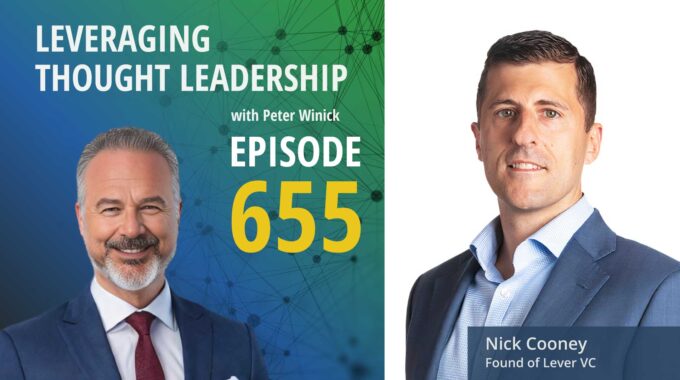Where Human Ingenuity Meets Machine Intelligence AI is transforming thought leadership—but not by replacing humans…
Moving from Corporate to Entrepreneur | Jennie Blumenthal

How to successfully transition from a corporate role to your own business.
An interview with Jennie Blumenthal about how she is helping women move from the corporate space into their own businesses.
Most people think that once you’ve hit the big role at your company, it’s smooth sailing. The reality is far different.
C-suite positions often have hardships, and many executives deal with a lot of stress and difficulty in their job.
Once you stop and realize that corporate life isn’t fulfilling for you, how do you move on?
On this episode, Jennie Blumenthal, founder and CEO of Corporate Rehab joins us to share her journey from executive to entrepreneur, and how she uses what she learned through more than 20 years in corporate America to help others find their way. Jennie’s also the author of Corporate Rehab: Ditch the Hustle Culture and Thrive Again, and we’re fortunate to have her share her insights with us, today.
During the Pandemic, Jennie was able to take a moment to stop and think about the corporate ladder she had been climbing. She stopped and asked herself, “Where is this going?” – and the answer was not one she liked. Following her heart, Jennie left her corporate job and started the journey of a thought leader, founding Corporate Rehab to help others in the same position. Jennie shares the hardships of the transition from corporate exec to entrepreneur, and how she needed to be brutally honest with herself about what she wanted to achieve, where she wanted to spend her time, and what it was better to outsource.
While thought leadership played a role in Jennie’s corporate position, she explains how it becomes so much more important for entrepreneurs. Without a big brand behind you, you need to produce quality content that shows your unique perspective, and find a way to share it so that others will lean in and listen to your insights.
Jennie shares valuable advice for people looking to leave corporate life, or those who already have – and are still struggling to find their way.
Three Key Takeaways:
- Once you are out on your own you need to think hard about what your voice is and how you’ll use it to impact your audience.
- As an entrepreneur you won’t be able to outspend big companies but thought leadership is the equalizer that lets you outthink them.
- Thought Leadership content can be used to build a rapport and relationship with an audience that will have value even if they are not in a buying position.
If you need a strategy to bring your thought leadership to market, Thought Leadership Leverage can assist you! Contact us for more information. In addition, we can help you implement marketing, research, and sales. Let us help you so you can devote yourself to what you do best.
Transcript
Peter Winick And welcome, welcome, welcome. This is Peter Winick. I’m the founder and CEO at Thought Leadership Leverage and you are joining us on the podcast today, which is Leveraging Thought Leadership. Today, my guest is Jennie Blumenthal. Jennie is the founder and CEO of Corporate Rehab, focusing on leadership coaching, speaking and workshops for female executives and companies on how to shift from surviving to thriving, retaining top talent and build a human centered culture. Jennie has focused for 20 years in corporate America consulting global C-suite execs. She was the previously led P.W. Marketing, sales and service team for consumer markets, and she’s been published in the Journal, Condé Nast, Adweek, and we can go on and on, but it’d be more fun to just talk to her. So, hey, welcome aboard, Jennie.
Jennie Blumenthal Thanks so much, Peter. I’m really happy to be here this morning.
Peter Winick Thank you. So how did Corporate Rehab get born?
Jennie Blumenthal Yes, it got borne out of my own experience of leading in corporate America for 20 years, burning out in the process. Although at that point it was 2020, we didn’t really have that language. So, I didn’t know I was in burnout and really wanted to figure out what made me stay in that situation. As long as I did, I was leading a business unit of $300 million, managing 300 people. I’ve got had two kids in elementary school at the time, doing school at the kitchen table in the middle of the pandemic and a husband in his own medical career. And so, we had a lot going on. And I figured I would keep pointing my ambition towards my job and walking up that career ladder or running up it until it didn’t work anymore. And we would just keep in the game as long as we could. And I think the pandemic really gave me a chance to pause and say, wait a minute, where is this ladder going to? And do I like the life that at the end of it or even the one that I’m living right now? And the answer for me personally was no. And I started the steps to step off. And part of where Corporate Rehab came from was people reaching out, saying, well, wait a minute, you were poised to take this next big job and you had it together. What happened and what are you doing? And so I jokingly told people, I’m putting myself through corporate rehab because I’m just detoxing from what I just went through and figuring out why I stayed in certain situations so long. There was so much that I loved about my job, but there were also a lot of things that really weren’t that healthy for me that I either tolerated or probably were needed in. And so that became a joke, and that’s really where it started. And then it evolved to a company in a book and adding 300 other women’s stories to the fold as I went.
Peter Winick Fantastic. So, the transition is going from a good corporate citizen that’s high performing with like the stellar track act and blah, blah, blah. So a lot of people would look at that from the outside and go, no one would give that up. That’s, that’s the man. That’s what I’m killing myself for trying. But I want to sort of pivot the conversation to the transition from being corporate to being an entrepreneur. Right? Because a lot of all clients, authors, speakers, academics, etc., crush it on the corporate side. Right. And they know how to navigate those waters, etc., etc.. And they’re really good and they know how to manage budgets and teams and whatever. And then they go out on their own and there’s a whole bunch of other things they need to think about like, oh, I’m in charge of i.t oh where their customers come from. So give me a sense of what the first couple of O’s were. Now that you’re out on your own and not sort of shielded from certain things behind a big corporate logo.
Jennie Blumenthal Yes. So great question. So much of what I do within corporate rehab is shift mindsets and behaviors for both people still in corporate America and for entrepreneurs. So, you can basically play big and thrive as a leader. And to your point, the actual motions in your day and the day in the life might be very different. But a lot of those mindsets and even some of the patterns that we get stuck in, you’re still you, whether you’re a corporate person, whether you’re a parent and what or whether you’re an entrepreneur and really just getting in touch with what were some of the mindsets that were keeping me playing small and what were some of the things that I was doing that really did not help me as an entrepreneur was one of the hardest things when I made that transition, things like how quickly to scale, I used to advise $30 billion companies. So doing that with a group of women that were growing from 1000000 to 3 and then and starting my own business, very different scale, very different perspective on how much you should lean into some of the risk. How much do you bet on the revenue coming? How much do you try to do yourself versus outsource?
Peter Winick And so let me let me pause there for a second. So mindset is a huge piece, but I think that oftentimes there are tremendous blind spots. I’m not suggesting this is you in actual skill sets. Right. That there’s so many things that as a corporate person. People don’t even need to think about, oh receivables. I mean, there’s a long, long list of things that like I wouldn’t even know how invoices get generated a update or receivables or whatever. So, I think some of the things that folks struggle with is really being honest about their inventory. Here’s my mindset. Clearly some things that need to change there. Here’s my skill set. What’s the gap? Because you don’t get a pass when you’re solo. Like if you got into finance, you don’t just skip that whole invoicing thing. If you’re not in. You’re not good at contracting. You don’t. There’s no skipping. So how do you advise or think about that?
Jennie Blumenthal I think part of it comes to being ruthlessly honest with yourself to your point of what are the things that you feel confident and what are the areas that are growth for you that you know, you can stretch and lean into with maybe some support. And then one of the parts that you just should outsource right away and not trying to take on yourself. So much of it, to your point, becomes how do you actually use not only your time but your mind? Because so much of the company is either riding on your personality, your contacts, your strategic thinking, your networking time that it becomes you don’t have that leverage. And so it becomes much more about how do you think about the things that only you can do or that you can do better than anyone? And then how can you really outsource or higher in a way that is sustainable in that early growth phase, I think is the hardest part.
Peter Winick Yeah. No, I think that, you know, we are living in a time where it’s so easy and inexpensive and accessible to outsource a lot of the mundane. So you learn to be a bookkeeper. Yeah, I guess you could. Could you? Here’s a long list of things that you have the ability to learn. Yes, but at the expense of what I think your point is, get on. It’s okay. The things that you need to focus on the things that you need to focus on. Tell me a little bit about the role of the book and then even pre that the role of thought leadership in your world, both on the corporate side and now as a you know, more an independent, as an entrepreneur.
Jennie Blumenthal I think that the thought leadership piece to me is so critical a lot of times. And on a coaching level, I’ll talk about two leadership transitions that my coaches need to make and how to know when you’re in one. The first is the agency stage where you’re actually finding your voice and the second impact where you’re actually using it. And I find that people get stuck in either one of those and they can happen multiple times throughout your career. You might be in a situation where you’re so heads down on things that you’re not picking your head up and saying, What is my point of view on what’s happening in the industry? How will the economy or politics or the issue of the day impact not only me, but my clients in the industry and my buyers and those types of things. So I think that piece is critical regardless of where you are at any level, whether you’re in corporate, whether you’re on your own, whether you’re a poor person or whether you’re doing business in addition to writing and speaking and all of these things. I believed in it very much when I was at P.W See and was media trained and had a lot of fun speaking to the press about all the things that we were building. I think I find it even more important on this side of the fence when you’re an entrepreneur, because so much of what you’re doing, you don’t have that brand behind you to your point, and you’re really trying to.
Peter Winick Spread.
Jennie Blumenthal The message and lift people whatever it is that you’re doing.
Peter Winick If you’re enjoying this episode of Leveraging Thought Leadership, please make sure to subscribe. If you’d like to help spread the word about our podcast, please leave us a review and share it with your friends. We’re available on Apple Podcasts and on all major listening apps as well as at ThoughtLeadershipLeverage.com forward slash podcasts.
Peter Winick So stay there a minute because you know, once you leave a big entity, you realize, you know, you’re a drop in the ocean, right? Is P.W. They’re a zillion times your size and people and offices or whatever. But I strongly believe and have seen it almost every day in my work that one of the beautiful things about thought leadership is you’re just as smart today as you were when you’re at PWI. They don’t you don’t leave the IQ at the door. But thought leadership allows you to punch above your weight in terms of the size of your entity in your organization. You can be just as smart. You can’t outspend them, right? You can’t outmaneuver them in certain ways. But you can produce beautiful, high quality, engaging, thoughtful work that you can get out there not to the universe. You don’t need to go buy billboards at O’Hare, but to the constituents that matter most to you to say, wow, this little agency I’ve never heard of, this little company I never heard of, they’re damn smart. Right. And I think it’s so cost effective, it’s so inexpensive, but so necessary for almost anybody going out on their own today.
Jennie Blumenthal I like that positioning, too, that you’re thinking about not just how do I outspend, but maybe David and Goliath is a bad analogy here. But, you know, think about your advantages, right? Your advantages. You don’t have to support all of those people. You don’t have to water down what you’re thinking or saying because you’re going to find a client, which is a very real thing, especially in a regulated industry and compliant.
Peter Winick Right. Well, there’s compliance and then there’s the politics of. Right, we can’t say something bad about, you know, whatever Monsanto or whatever because we do business with them or do all that. I think speed is also an issue. I mean, an individual or a smaller entity. The speed and agility are a huge advantage because even, you know, big organizations that move quick, it’s a lowercase Q.
Jennie Blumenthal Oh yeah.
Peter Winick Yeah.
Jennie Blumenthal Very true. I think just having that perspective that it really is an advantage and then being really honest with yourself about what your actual goals are. My goals aren’t to grow back into a $30 billion company. That’s not success for me. So if my goal is actually to scale to something sustainable, spread this message to as many executives who need to hear it, who have a chance to change their own leadership style. What types of things might I do going to revenue generating? What types of things might I do that are message spreading? And how do I think about what that looks like and thought? Leadership plays a huge role in that because coming out and saying, here’s what I think and telling somebody on LinkedIn or in an article that I don’t ever expect to buy something from me is actually a huge value relationship. But again, you don’t have the benefit of doing. If you’re trying to grow at 30 and 20% a year so that you can keep people employed, you might be in a different set of decisions. So I think that yeah.
Peter Winick I also think there’s another value prop to smaller organizations relative to thought leadership and that’s the relationship development, right? So you put out work, there’s a self-selection piece which is really, really great, right? Like we nobody really wants to be in the business of converting someone that like your whole work on mindset. If there are people or organizations or entities out there that just absolutely don’t believe in that, that’s awesome because you don’t want to waste your time talking to them. Like change their mind, let them be well, whatever. I don’t think there is a strategic and deliberate way to use thought leadership to develop rapport and relationships. And it could be as simple as you’re writing an article on the power of mindset, whatever. Right. And then you want to reach out to folks that, oh, by the way, they might kind of look like people that could be your client at some point, but it’s not. Hey, it’s Jenny. Can I show you some consulting? It’s me. Can I get your point of view on an issue that I know that is important to you? And it’s important to me why I’m writing this article. You know, we’re talking on the podcast. We’ve had 450 guest. I’ve developed so many awesome relationships with amazing people based on the fact that they want to be on the podcast. We have a common interest, blah, blah, blah, and it’s a really nice way to show who you are and what you’re about. In a non you take that salesy ness out of the relationship building, which is.
Jennie Blumenthal Great. What’s your point? You’re just creating value, right? And you don’t know whether that’s going to get translated into monetary value or whether that’s support for somebody else. But even that the thought leadership. One thing to think about that I didn’t anticipate that’s been helpful is some of the items that I write, I have the freedom to put out there. And in terms of burnout or, you know, situations where there’s toxic workplaces and what people will message me is I can’t like your post because my boss was right.
Peter Winick Right.
Jennie Blumenthal Thank you for writing this, because now I become somebody they can use to say, did you see that piece that that woman wrote on this? And instead of them saying, I don’t feel safe, it starts a conversation. And then they can have that conversation in a team setting using somebody else’s perspective. And I think that’s beautiful that it just opens up a chance to discuss burnout in a way that maybe someone feels uncomfortable bringing up to their boss. But if we’re putting out article perspectives, then they can share something. And actually, I think that.
Peter Winick Whole the whole people get obsessed with what I would call a lot of the vanity metrics on social ooh, look at me once I got look how many retweets or whatever. And I think sometimes those are important. If you can actually connect and correlate them to the outcomes that you’re looking for, sometimes they’re actually absolutely useless. Right. And I think there is a massive population, particularly LinkedIn, which has become the de facto place for many of us to share our ideas. Right. And I call them lurkers, right? So for whatever reason, they’re not going to publicly like something, you know, they’re not on LinkedIn as frequently. They don’t want to comment because they’re afraid. Not afraid, but it might not show well internally, blah, blah, blah, blah, blah. But then when they, they come out, they’re in, right? So they might reach out to you and say, Hey, Jenny, I’ve been following your stuff for a year and a half and like, it wouldn’t be wise for me to like the article that you wrote on Ten Reasons Ten Ways to Manage Your Boss, the Jerk. Right? I need to talk to you, and I’m ready to work with you. And it’s almost like the sales cycle has been compressed because they’re consuming in their way at their cadence, because we, you know, professional services, we always have the supply. We don’t know what that demand is. Right. So I think it’s really interesting about nurture, a relationship that might seem invisible and then over time realizing like, wow, there it feels like they’re popping out of the woodwork.
Jennie Blumenthal Yes, that’s right. Well, that’s definitely been my experience. And I think to your point, it felt very natural to me. But I think what I didn’t realize is I was teaching them how I will work with them. You know, if you’ve already been saying here’s all these tips on things, yeah, you’re right. They get I don’t have to get on the phone and say, well, I post about helping leaders thrive and I like to be transparent, like they know that already. Because one of.
Peter Winick The things I love is, you know, you’re having a conversation with someone for the first time, a real conversation, and they’re either quoting you back to you, maybe not verbatim, but they know your voice right there, like they kind of have been in your head because they’ve read a few of your articles or your videos or whatever, and it makes it really nice, right? Because they it’s the self-selection because you don’t have to convince them that you’re smart or that your mindsets align with they’re like, that stuff’s been done. Which is the not fun part of sales. Is that convincing poor leadership could grease the skids of convincing that need to happen for people to feel comfortable with you. Cool. Any other thoughts? Advice, recommendations on people that are out there that want to leave corporate but won’t like your stuff coming up on the other side?
Jennie Blumenthal Yeah, I think my two things I’ll say on that is usually ask yourself why you want to leave to really challenge. Is it something within the corporate lifestyle or is it something within you and really get some ruthless honesty there because often we’ll leave and we think the grass is greener. And to your point, there is a lot of the same challenges we either bring with us or we don’t anticipate. And for those who feel like they know they want to leave, but they just can’t take the plunge, ask yourself, why not? Is there an actual financial piece that’s holding you back and you’ve got you need to get some clarity on is there that you don’t know what you would do and what that message would look like? Start networking with some others and testing out some messaging and figuring out what your niche is that gives you just that confidence to then take that, take that leap and step off on to the other side. And certainly if you have you need coaching, you know where to find me exactly.
Peter Winick Well, this has been fantastic. I appreciate your time and sharing your story with us today. Jenny, thank you so much.
Jennie Blumenthal Thanks for having me, Peter.
Peter Winick To learn more about Thought Leadership Leverage, please visit our website at ThoughtLeadershipLeverage.com to reach me directly. Feel free to email me at Peter at ThoughtLeadershipLeverage.com and please subscribe to Leveraging Thought Leadership on iTunes or your favorite podcast app to get your weekly episode automatically.






